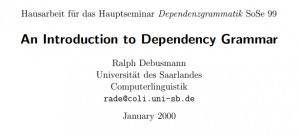PDF #36 – Debusmann, Ralph – An Introduction to Dependency Grammar

Many linguists consider Dependency Grammar (DG) to be inferior to established phrase structure based theories like GB (Chomsky 1986), LFG (Kaplan & Bresnan 1982) and HPSG (Pollard & Sag 1994). The aim of this article is to remedy this state of affairs by seeking to make those unconvinced of DG perceive the benefits it offers. To this end, section 2 makes the reader acquainted with the basic concepts of DG, before section 3 sets the theory against phrase structure based theories, arguing that it has considerable advantages in the analysis of languages with relatively free word order (e.g. German, Finnish, Japanese, Korean, Latin, Russian). Section 4 describes
Duchier’s (1999) DG axiomatization as a prototypical example of a DG that separates dependencies and surface order. Thereafter, section 5 proceeds with an overview of current Dependency Grammar formalisms and section 6 rounds the paper up.
Modern Dependency Grammar has been created by the French linguist Lucien Tesniere (1959), but as Covington (1990) argues, DG has already been used by traditional grammarians since the Middle Ages. The observation which drives DG is a simple one: In a sentence, all but one word depend on other words. The one word that does not depend on any other is called the root of the sentence.
I think an introduction to Dependency Grammar has an undeniable advantages for describing languages with a higher degree of word order variation than English. But these advantages can only crop up if one lifts the constraint of projectivity and treats surface order separately from dependency. An argument by Rambow & Joshi (1994), stating that no well-behaved parsers for such DGs exist and that for this reason, non-projective DGs are hampered, can be turned down by mentioning recent advances (e.g. Bröker 1998, Duchier 1999, Jarvinen & Tapanainen 1997) alone.
You can find more PDFs on other important ESL subjects in the the PDF section of this website.
